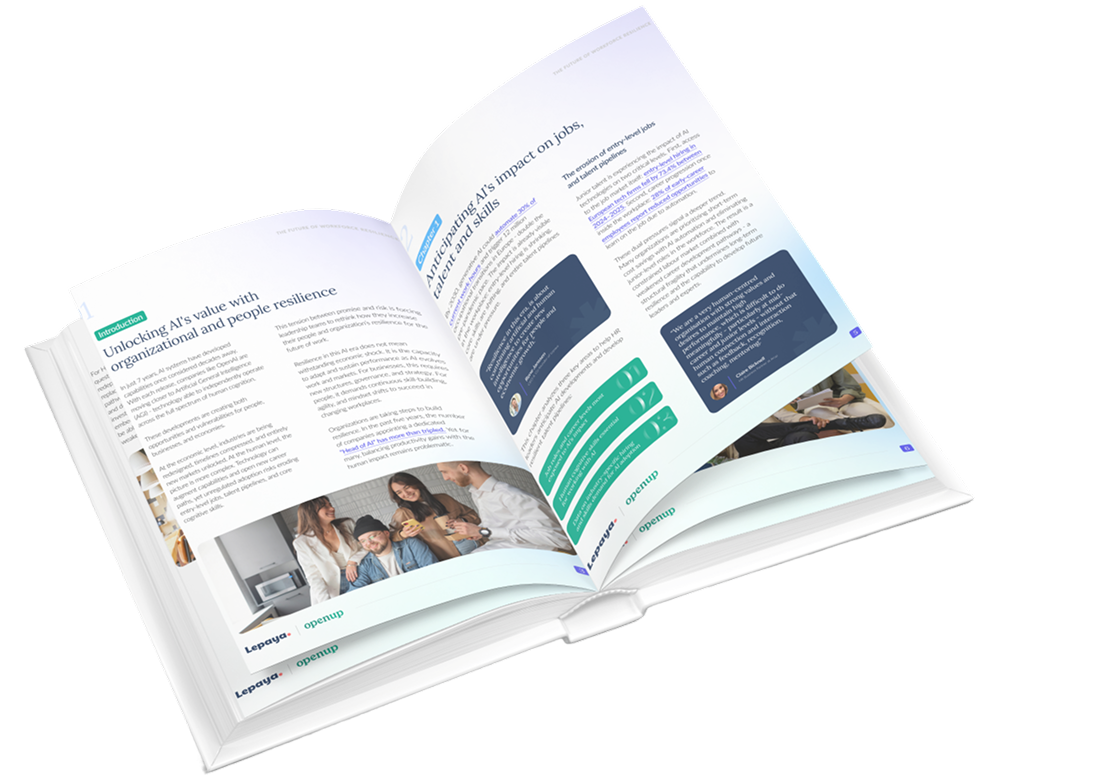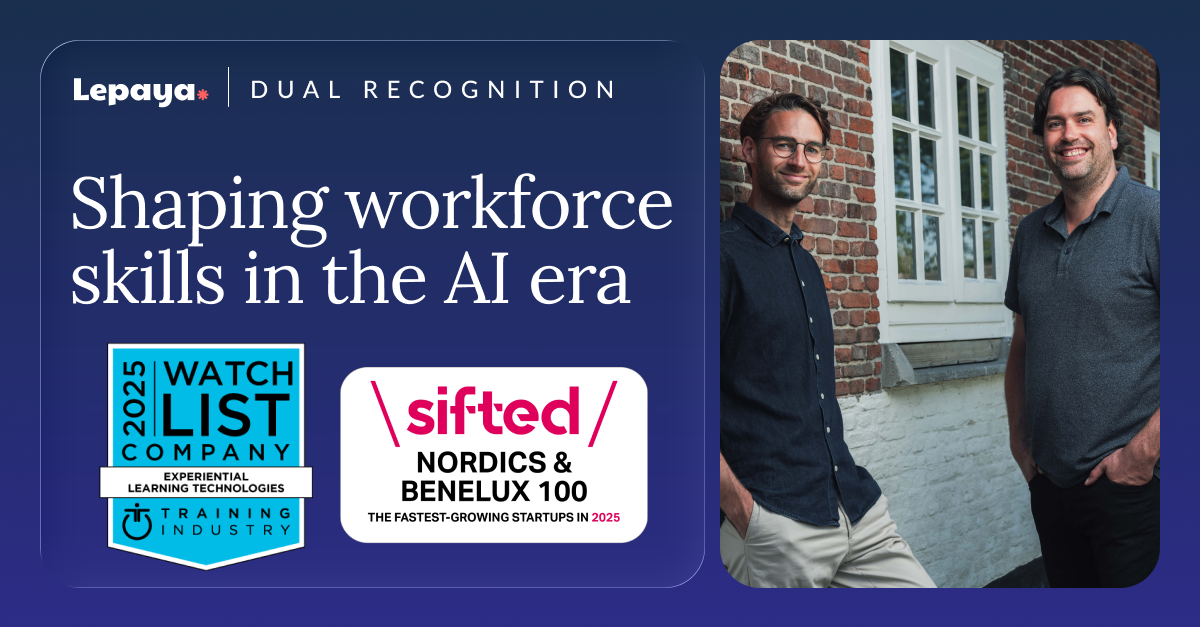New report reveals how Europe’s leading firms are building AI-resilient workforces
.png)
- Lepaya releases workforce resilience research analyzing 2,200 job openings from 110 high-growth companies across finance, technology, and professional services sectors.
- AI adoption reshapes hiring patterns with 75% of roles now mid- or senior-level, while employers prioritize human skills like ethical judgment, analytical storytelling, and stakeholder influence alongside AI expertise.
- Psychological safety emerges as critical barrier to AI integration, with 62% of Gen Z workers hiding AI usage and only 7.5% receiving substantial employer training, highlighting need for leadership development and trust-building.
Amsterdam, 11 November 2025
Lepaya, Europe’s leading blended training company, releases new research on the skills and talent profiles high-growth companies are prioritizing. By analyzing 2,200 job openings across 110 growing firms, the report highlights how these organizations are increasing resilience for rapid technological change and AI adoption.
By 2030, GenAI is expected to automate 30% of current work hours and trigger 12 million occupational transitions in Europe. As AI’s influence on skills and job roles grows, organizations face new pressures to increase workforce resilience for the future of work.
The Future of Workforce Resilience highlights how AI is reshaping employee psychology, organizational structures, and the skills that drive business performance. Building an AI-resilient organization now demands continuous skill-building and new leadership capabilities to guide people through uncertainty.
To prepare for large-scale AI adoption, the research informs HR teams how to anticipate AI’s impact and develop talent with the right combination of technical and human skills to sustain productivity.
AI adoption reshapes hiring across industries
As AI transforms business operations, Europe’s leading companies are redefining the profile of high-value talent. Lepaya’s research of 2,200 job openings across 110 high-growth firms in finance, technology, and professional services reveals two defining trends.
First, 75% of open roles are mid- or senior-level, while entry-level hiring has dropped below 20%. With automation replacing entry-level work, talent pipelines are thinning and creating a forthcoming labour risk.
Second, organizations are looking to balance advanced AI capabilities with the human intelligence needed to commercialize and operationalize new tech. Employers now seek professionals who combine AI expertise with qualities machines cannot replicate: ethical judgment, analytical storytelling, and stakeholder influence.
“To support AI adoption, we offer flexible learning opportunities so everyone can grow in their own way. With the AI Literacy Framework, based on OECD principles, we identify key AI competencies, analyze skill gaps, and guide HR initiatives like training, reskilling, and cultural adoption. This approach ensures AI literacy is embedded structurally across the organization. ” — Naomi de Wolf-Melching, Strategic L&D and Talent Consultant at VodafoneZiggo
Leadership development and psychological safety: The missing link to AI integration
AI adoption is surfacing a new challenge: psychological safety. Employees are expected to use AI effectively but often lack the confidence or guidance to do so.
62% of Gen Z workers have used AI to complete tasks but pretended the output was their own, while over half feel uncomfortable admitting to managers that they don’t fully understand AI tools and only 7.5% have received substantial AI training from their employer.
The result is a quiet crisis of confidence. Data from OpenUp - a leading institute for employee wellbeing - shows that Gen Z represents nearly a quarter of all their active users, with the majority seeking self-guided mental well-being support - reflecting a preference for privacy and a reluctance to engage in open discussion about challenges.
To build truly AI-resilient organizations, leaders must move beyond technical enablement and invest in leadership development that creates trust, openness, and learning safety. When leaders model curiosity, normalize trial-and-error, and respond productively to failure, teams develop the confidence to learn with AI instead of hiding from it.
“One way leaders can foster psychological safety is to respond productively to failure. Nobody knows where this AI ride is going to take us. In dealing with innovation, failure is a given. The way leaders and organizations respond to it determines whether people hide or share what they’ve learned.”
— Carlijn Kriek, Head of Talent & Leadership Development, City of Amsterdam
Human intelligence: The competitive advantage in the AI era
Resilience in this AI era demands global workforces to sustain performance as technology continuously reshapes work. For organizations, this requires new governance, structures, and leadership capabilities. For people, it demands agility, continuous learning, and critical thinking.
Europe’s most forward-thinking firms are already developing these human skills to fully realize AI’s potential.As machines become smarter, it’s human intelligence - empathy, judgment, creativity, and leadership - that remains the true competitive advantage.
About Lepaya
Lepaya is Europe’s leading blended training platform that connects workforce upskilling with business impact, empowering companies to develop the right skills at the right time to drive both people and business growth.
Through its Portal, Academies, and App, Lepaya seamlessly aligns business and workforce needs, delivers blended training programs for every career level, and enables learners to learn, practice, and apply new skills effectively.
Trusted by global enterprises and fast-growing companies—including Roche, ING, Microsoft, Dell, Freudenberg, and Just Eat Takeaway—Lepaya helps organizations stay competitive in today’s rapidly evolving business landscape. Backed by investors like Endeit, Educapital, Target Global, Mediahuis Ventures, and Tablomonto, Lepaya has raised $80 million and made four strategic acquisitions: SmartenUp (2020), vCoach (2022), SpeakFirst (2022), and Krauthammer (2023).

Related news
Ready to drive impact together?
Close skill gaps, accelerate growth, and future-proof your workforce.












.jpg)
.png)


.png)